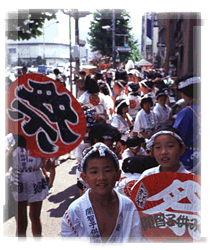
home
news
charter
contacts
charter members
scholars
projects
text initiative
links
library
comments

![]()
The Center for Shinto Studies
Objectives of the CenterThe academic study of one of the world's oldest religious traditions, which we today call "Shinto," has until recently been limited to an occasional book, article, or chapter in a general book on religions. And yet, for millions of Japanese both past and present, cultural and social influences from the tradition of "Shinto" permeate what might be called a Japanese worldview. From folktales about powerful deities (kami), to shamanic practices of exorcism and healing, to festivals large and small honoring specific kami associated with a region's economic livelihood, to the thousands of shrines all over Japan, to imperial household and the historic involvement of the Japanese state---the phenomenon of Shinto-style kami veneration and ritual practices deserves a sustained academic investigation equal to other religious practices in other parts of the world. Indeed, through the comparative and cross-cultural study of the world's religious traditions, greater understanding of religious similiarities and tolerance for religious differences can be a valuable contribution of academic research.

The Center for Shinto Studies, affiliated with the University of California at Berkeley, is the first institution of its kind in North America. Organized and administered by established scholars representing many academic disciplines, the Center is a multi-disciplinary, non-partisan, non-religious organization whose general objectives are threefold:
- First, to establish an international network of scholars and lay researchers working on academic topics related to the study of the Shinto tradition in Japan
- Second, to establish databases on a variety of topics and themes (discussed below) accessible free of charge to anyone with a computer and modem
- Third, to sponsor and encourage the exchange of information via symposiums, conferences, and exchange programs in ways that increase understanding and collegiality, and which remain true to the spirit of free academic inquiry
Location
The Center for Shinto Studies is located just north of the U.C.Berkeley campus in a building owned and operated by the Pleroma Institute. Close to the Graduate Theological Union as well (one of the largest training institutes for religion in the United States), the CSS has working and research affiliations with U.C. Berkeley, the Graduate Theological Union, and the Pacific School of Religion. Scholars and students will be able to use both the Main and East Asia libraries at U.C. Berkeley, and the Graduate Theological Union's library.
Founding Member Scholars
- Professor Delmer Brown (UC Berkeley History, emeritus) is the "father" of the Center for Shinto Studies and Professor Emeritus of History at the Univesity of California in Berkeley and Adjunct Professor of Shinto at Starr King School for the Ministry in Berkeley. He is co-translator of "Studies in Shinto Thought" by Muraoka Tsunetsu, and of the "Gukansho" by Jien. He has authored two chapters and the Introduction of The Cambridge History of Japan Vol. 1 and is now working on a book-length study of "Amaterasu in the History of Japan", as well as teaching a seminar on Shinto at Starr King Theological Center, part of the Pacific School of Religion at U.C. Berkeley.
- Professor Lewis Lancaster is a Professor of East Asian Languages, University of California at Berkeley, head of Electronic Publications for the American Academy of Religion, Chair of the Electronic Resources Development Work Group for Association of Asian Studies, and member of the Board of Directors for Pleroma Institute which is currently working on a database titled "The Electronic Cultural Atlas Initiative."
- Professor George Williams (California State University, Chico) is a Professor of Religious Studies and Asian Studies at California State University, Chico. He is a specialist in interfaith dialogue and liberating (liberal) religion. He is a pioneer of the sub-discipline of experiential phenomenology as well as interactive, digital learning (internet, CD-rom, video, etc.).
- John Nelson (University of Texas at Austin) is an Assistant Professor in the Department of Asian Studies. He has done extensive ethnographic fieldwork at Shinto shrines in Japan and is the author of the 1996 book A Year in the Life of a Shinto Shrine (Univ. of Washington Press). He has produced a documentary film titled "Japan's Rituals of Remembrance: 50 Years after the Pacific War," and has book on Kyoto's Kamowake Ikazuchi shrine forthcoming from the University of Hawai'i Press in 1999.
- Norman Havens is the Permanent Lecturer at the Institute of Japanese Culture and Classics at Kokugakuin University in Tokyo. A specialist on pilgrimage and the Ise-mairi phenomenon of the 17th and 18th centuries, he has translated a wide variety of texts into English. As the principal translator for the Institute of Japanese Culture and Classics, he has to his credit works on Japanese festivals, new religions, and pilgrimage (forthcoming).
scholars | projects | text initiative | links | library
comments
Updated 14-July-99